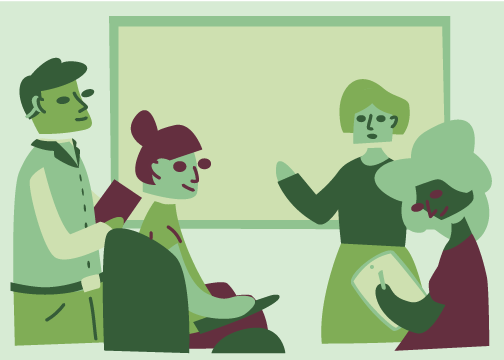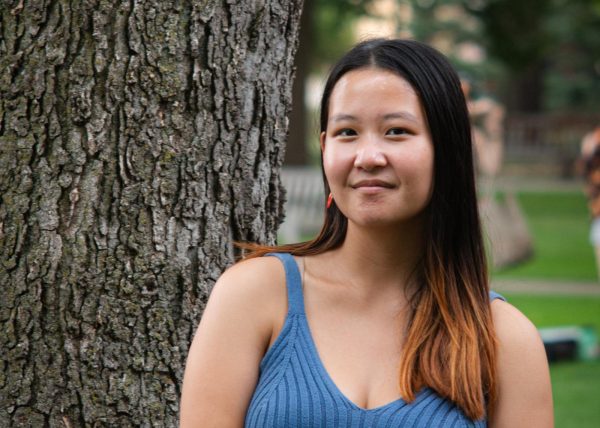Progress toward a disability studies concentration

Graphic by Zander Leong ’26.
April 13, 2023
This Wednesday, April 12, a presentation titled “Imagining Disability Studies @Mac” was held in room 200 of the Janet Wallace Fine Arts Center. Presenter Ashton Rose ’25 examined the state of disability services at Macalester, the importance of disability studies, as well as aims and areas for growth.
The main goal of the event was to present the progress that Rose has accomplished towards the establishment of a disability studies concentration at Macalester. Inspired by a course that they took last semester in sociology entitled “Care versus Cure: The Sociology of Disability,” Rose was inspired to engage with others who have taught courses on disability and are otherwise interested in increasing awareness about engaging with the subject.
“Before going into Lisa [Gulya, visiting professor of sociology]’s class last term, I identified as disabled,” Rose said. “But I didn’t think a lot about what that meant, and that class provided me an opportunity to really interrogate my own identity and to really understand how I fit in the world with other people.”
Since then, Rose has gathered support from professors across departments such as psychology, sociology and English. In collaboration with her roommate, Courtney Brown ’25, they explored courses that focus on or mention disability within the course catalog. This amounted to eight courses specifically discussing disability and 11 that mention or address disability. Aside from the courses, they have also found over a dozen projects surrounding disability by former Macalester students.
The process of establishing a concentration at Macalester is arduous. Interested parties must spur engagement with the concentration, gather a committee of interested faculty and create a proposal that will go before the Educational Policy and Governance Committee (EPAG). Following evaluation by EPAG, the proposal will be voted on by the faculty as a whole.
By establishing this concentration, Rose hopes to increase awareness and start conversations regarding disability while simultaneously creating a space for faculty to explore disability as subject matter in their pedagogy.
“Disability Studies provides a way to interrogate many different ways of being and many different facets of life experience in a way that other disciplines don’t,” Rose said.
Rose also referenced Macalester’s commitment to internationalism and multiculturalism, making a point of how important disability studies is to these subjects.
“For Macalester to not recognize and support disability studies is to leave out a part of that multiculturalism experience and part of that internationalism experience because they’re ignoring a large facet of human society,” Rose said.
Disability studies is a growing field with increasing interest. Both Carleton College and the University of Minnesota have adapted to this interest, with Carleton establishing a disability studies minor, and the University of Minnesota offering a disability policy and services certificate for graduate students.
Furthermore, increased scholarship in disability studies means enhanced accessibility and knowledge at Mac, something that Rose hopes to work towards. Having a concentration would allow for those interested in the subject to build community, similar to how majors/minors currently function.
“There are entire people whose jobs revolve around disability studies,” Rose said. “Getting people to explore that more when you’re in college and have that help you set up in your career afterwards [would be] extremely valuable.”
Rose also hopes to improve other aspects of the Macalester community related to disability. These changes would come in the form of increasing accessibility to course materials, enhancing some of the services offered by disability services and creating community inthe form of a disability cultural center or other space.
“A disability cultural center is something that I didn’t even know about before last term … a dedicated physical space on campus to support the knowledge around disabilities, so that disabled students can have that community center,” Rose said.
Following the presentation, the event was opened to the audience for a period of Q&A. Audience members included students, faculty and staff members, and alum Kate Gallagher ’16, whose capstone project on disability accommodation and accessibility has aided Rose in their work.
“[Creating] more of those faculty student relationships can be really important around scholarship and increasing any sort of scholarship, but especially in disability studies,” Rose said. “Even if [a concentration] is resource-neutral, it takes time … the college needs to know it is worth it.”
For those interested in the prospect of a disability studies concentration, increasing their awareness of disability issues or wanting to offer support, there is still work to be done. As work toward establishing this concentration moves forward, student and faculty support will be essential. Additionally, creating space to talk about disability services and help others to become motivated to pursue these goals is a great place to start.














